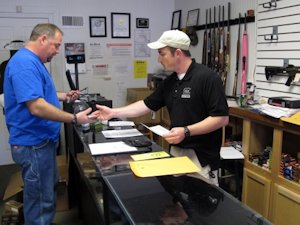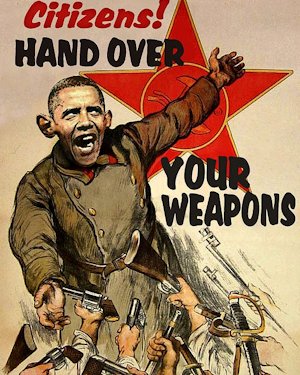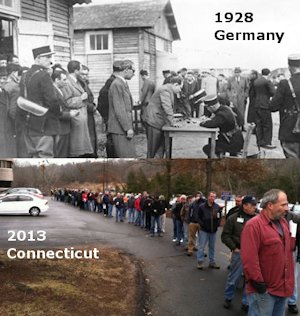Rethinking Gun Control, Part 7: Registration
 | | Here we see how gun control registration discriminates against the illiterate |
Last April, the Connecticut state legislature passed a new law requiring its residents to register all military-style rifles under private ownership by December 31. According to state law enforcement, roughly 50,000 applications were received by the deadline, which is far short of the best estimates of the number of such weapons owned in the state, a number that could be upwards of 350,000. Whether this lack of registration is caused mainly by organized civil disobedience, laziness, or ignorance is unclear, but what is clear is that the effort to reduce crime (in the wake of the Sandy Hook tragedy) has potentially created over 100,000 new criminals who face a penalty of one to five years in prison and an up to $5,000 fine.
Connecticut's experience is hardly unique in this regard. Canada, for instance, passed a similar long-gun registration law in 1995 that required all owners of long-guns to register their weapons by January 1, 2003. Due to severe cost overruns, stunning non-compliance figures (which go as high as 70%, depending on who you ask), political corruption, a lack of verifiable firearm crime reduction, and growing public opposition to the registry, the law was largely repealed and the registry ordered destroyed in 2012.
 | | Clearly an accurate representation of reality |
When looking at how other countries handle gun control, one thing that stands out is the ubiquity of firearm registration. Nearly all countries require some form of it, with the United States being a notable exception. In the United States, the creation of a federal gun registry is strictly prohibited by law. Even the failed Toomey-Manchin bill, which gun control advocates supported in large numbers, contained strict language against the creation of such a registry. On the surface, the idea of a gun registry seems pretty logical. If all guns were registered to their owners, then gun crime would be much easier to track and control. In theory, this should reduce crime or at least increase the effectiveness of law enforcement. Why, then, is there so much opposition to it?
While the Supreme Court recently struck down its ban on the ownership of handguns, the District of Columbia has a mandated gun registration process that has been in place since 1975. As we've already seen, however, D.C.'s firearm death rate far exceeds the figures of any of the 50 states. Remembering that correlation does not equal causation, one must carefully check to see if the gun violence rates were higher or lower before the 1975 registration law, a statistic that is ambiguous at best. The same is largely true of New York, where registration has been intermittently enforced for many years and recently increased by the SAFE Act.
 | | "We tried to make gun registries extra illegal, but the NRA wouldn't hear of it." |
Still, even if one concedes that these examples demonstrate that a gun registry doesn't appear to reduce crime, it doesn't seem to increase it, either. Most countries have had their gun registries in place since before World War II (including Canada, by the way, in which all handguns have been subject to registration since 1934), and comparing the rates of gun violence before and after such a distant cut-off date is hardly conclusive, given that firearms weren't nearly as affordable, as accessible, or as deadly back then as they are today. Perhaps one can argue that these registries are effective because they've been in place for so long, but it would be difficult (maybe impossible) to prove that.
The long-standing existence of these registries, though, seems to remove one of the favorite talking points of registration opponents: the idea that registration inevitably leads to confiscation. While it is true that gun confiscation probably requires a certain amount of prior registration and that countries that have tried to confiscate weapons from the populace have almost universally had registries in place, it is hardly definitive that a government must be on the road to confiscation if it requires registration. This slippery slope argument is easily deflated by citing the long history of gun registries in Canada, the UK, and Australia. Those registries were put in place following the Bolshevik revolution, largely to protect against the rise of communism, but they have lasted longer than the Soviet Union did. Then again, starting in 1997, the UK did begin confiscating handguns.
 | | This settles it: standing in line makes you a Nazi |
The Second Amendment, though, as previously discussed, clearly prevents the United States federal government from confiscating guns (and the Fourteenth Amendment prevents the states from doing it too). This, in and of itself, is proof that the slippery slope argument is flawed. No gun registry in America can take away a person's right to keep and bear arms; only a repeal of the amendment can do that. Therefore, shrill cries that registration is merely the precursor to tyranny can, for now, be safely ignored.
So, from a policy standpoint, the bottom line is this: is gun registration worth it? Registries are expensive to maintain, as Canada so vividly demonstrated, and difficult to enforce, as Connecticut is learning today. They don't appear to have much of an impact on crime (because, stubbornly enough, criminals don't tend to obey laws requiring them to register their weapons), and law enforcement is pretty evenly split as to whether or not a registry helps much after the fact. I am not convinced by the typical libertarian stance that registration is a threat to liberty--after all, I don't have a problem registering to vote--but I am also not convinced that gun registration is a logical approach to solving any problem facing this country today. I say we let states like Connecticut continue to experiment in the hopes that maybe we will stumble upon something successful, but until I see compelling evidence that gun registries can work, I'm going to oppose them as wastes of time, money, political capital, and energy.
-e. magill 2/20/2014
|
|